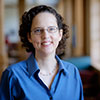This article is more than 5 years old.
A keynote speaker used ‘gatekept’ as a past participle verb. The OED hasn’t caught on to that yet, but the Google Ngram shows a small but steady increase in the word since 1970.
In “The Changing World of eBooks,” Mike Shatzkin focused on the viewpoint of trade publishers. They’ve discovered that most readers just want to be alone with their books. They don’t care about enhanced content. (He pointed out that this applies to immersive reading for adults. It does not apply to children’s books, how-to, cookbooks and a few other categories.)
In “Ebook Availability Revisited” (the session I saw with Lauren C.), the authors advocated against buying (as opposed to renting) any e-books. They assume that the legal issues surrounding Hathi Trust and Google Books will resolve in a few years. Then we can just buy/lease from them. They promoted subscription over DDA, and came down strongly against doing e-book approvals when DDA is available.
Later that afternoon, I attended the “TRLN Oxford University Press Consortial E-Books Pilot” representatives from Duke, UNC-CH, NCSU, YBP and OUP described how they initiated a shared-cost model for the entire output of Oxford’s UPSO product. (BTW, the Charleston program copyeditors need to decide among ‘e-book,’ ‘eBook’ or ‘ebook.’) I’m skeptical about the ‘Big Deal’ model spreading to e-monographs, but I nonetheless heard this session with great interest. The schools shared costs based on what they thought fair, e.g. accounting for size of school, nature of school, etc. They also purchased one print copy of all non-STEM books. They placed the print in OSS. Records processing work was shared out, with one school processing all the print and another all the electronic. They didn’t go into this hoping to save money – their hope was to expand access for the same money. Access for alumni was also included. I wrote that down calmly in my notes, and then I got excited since that includes me! The speakers noted one significant challenge: OUP excludes some books from UPSO and releases others online after a delay. Therefore, if a selector sees an OUP book of interest, should they buy the print or not?
I ended the day by giving a “shotgun” presentation on the incentive program we ran last year. See my slides on slideshare.
On Friday, I attended “Overview of the Altmetrics Landscape.” The presenters outlined at least five alternatives to traditional journal-level metrics: Impact Story, Altmetric, Plum Analytics, Science Card and Mendeley. They also mentioned the attributes of an ideal altmetric system: free, API available, relevant, and immune to rigging/gaming. The next steps are to explore use cases, give context to numbers and continue to combat gaming.
My final Friday session was “Changing the DNA of Scholarly Publishing – The Impact of the Digital Leap.” Damon Zucca from OUP discussed how the Oxford Handbooks series changed when it became an online product. From the print world, they knew that authors who met the deadline didn’t want their chapters held hostage by those who didn’t meet deadline. They also learned that users often sought out specific essays. Therefore, the obvious decision was to make chapters available online as soon as possible and not worry as much about the container. Lisa Jones from Georgia Gwinnett College had the privilege of starting a brand-new collection when her college opened in 2006. She had an e-book subscription (i.e. the approach advocated by the Thursday presenter), but dropped it due to insufficient use. (I also heard a speaker in this session say ‘editors-in-chief.’ Google Ngrams reveals this is indeed the popular usage. Can you tell how much I love Google Ngrams?)
Finally on Saturday, various vendors hosted 30-minute sessions on new products. As Classics and Linguistics liaison, my obvious choice was a presentation on the Dictionary of American Regional English (DARE) and the Loeb Classical Library. Both online products are still in development, but I’ve signed up to beta-test DARE.

4 Comments on ‘Carol in Charleston, with Random Linguistic Side Notes’
Carol, you really made the most of your Charleston trip! Thanks for the post. (and I’ll be checking out Google Ngrams)
Carol, you are much too modest. Congratulations on your presentation. Your slides are terrific! Lots of radical ideas out there in Charleston-land…
Thanks for turning me on to Google Ngrams – it’s right up my alley! And also thanks for the wag of the finger to editors and the eBooks – e-books – ebooks inconsistencies! Thanks for the write-up. I would really like to attend Charleston – perhaps next year.
Carol, thanks for bringing linguistics to the people. Your posts are always so enlightening, and in so many ways.